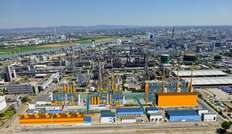
New Acetylene Plant
BASF is constructing a world-scale acetylene production plant at its Ludwigshafen site, set to start operations at the end of 2019. This new facility will replace the existing plant and will have an annual production capacity of 90,000 metric tons of acetylene, utilizing the world's most efficient production process.
Efficiency and Competitiveness
The new plant aims to strengthen BASF's Verbund by ensuring an efficient supply of acetylene, a key intermediate, thereby improving competitiveness and supporting growth in various acetylene value chains. The plant will feature state-of-the-art technical equipment and processes, reflecting over 50 years of BASF's expertise in acetylene production.
Resource Utilization
Integrating the new plant within BASF's Verbund approach offers advantages such as efficient use of resources, excellent production synergies, and short supply routes. The modern production process will use raw materials efficiently, and the heat generated during production will be harnessed to generate energy. This results in a higher end-product yield and efficient use of by-products.
Applications of Acetylene
Acetylene is a versatile chemical component used as a starting material for many everyday products, including pharmaceuticals, plastics, solvents, electronic chemicals, and highly elastic textile fibers. These products are utilized by BASF customers in various industries such as automotive, pharma, construction, consumer goods, and textiles. BASF also operates an acetylene plant at its Verbund site in Geismar, Louisiana, since 2000.

